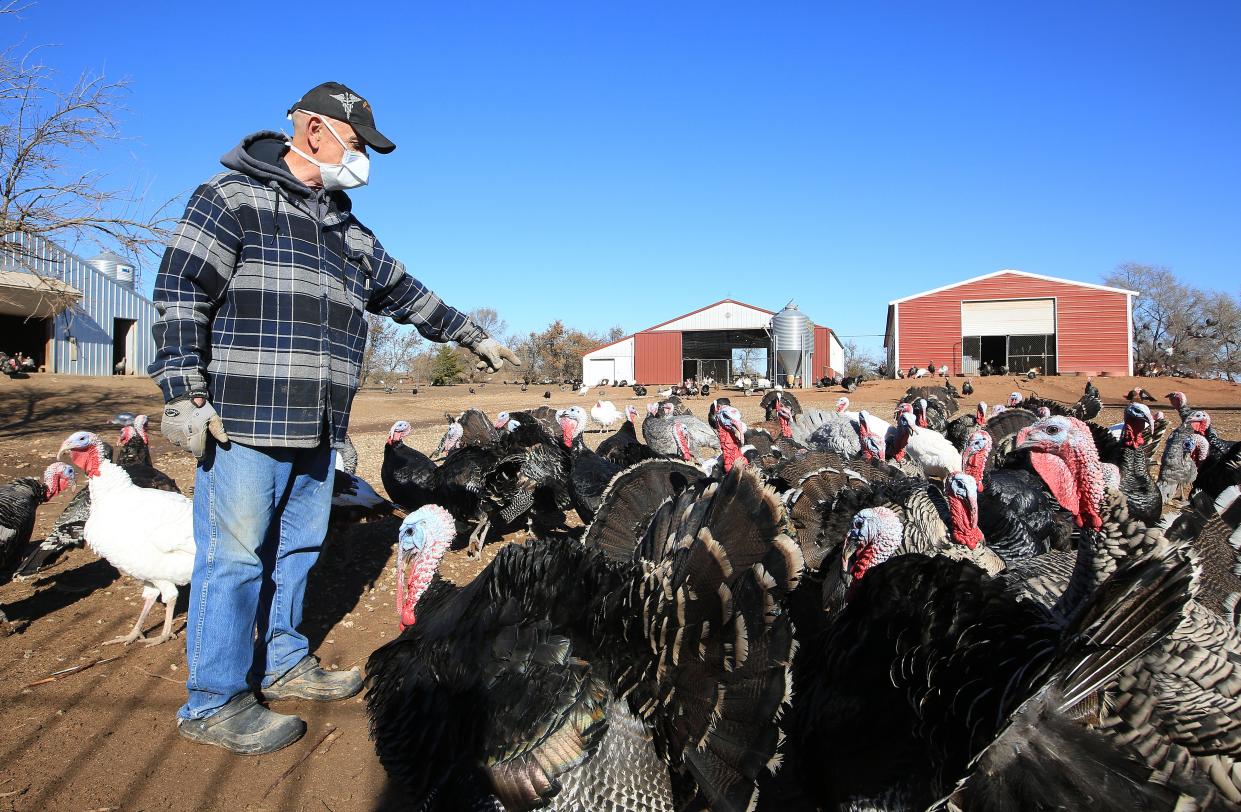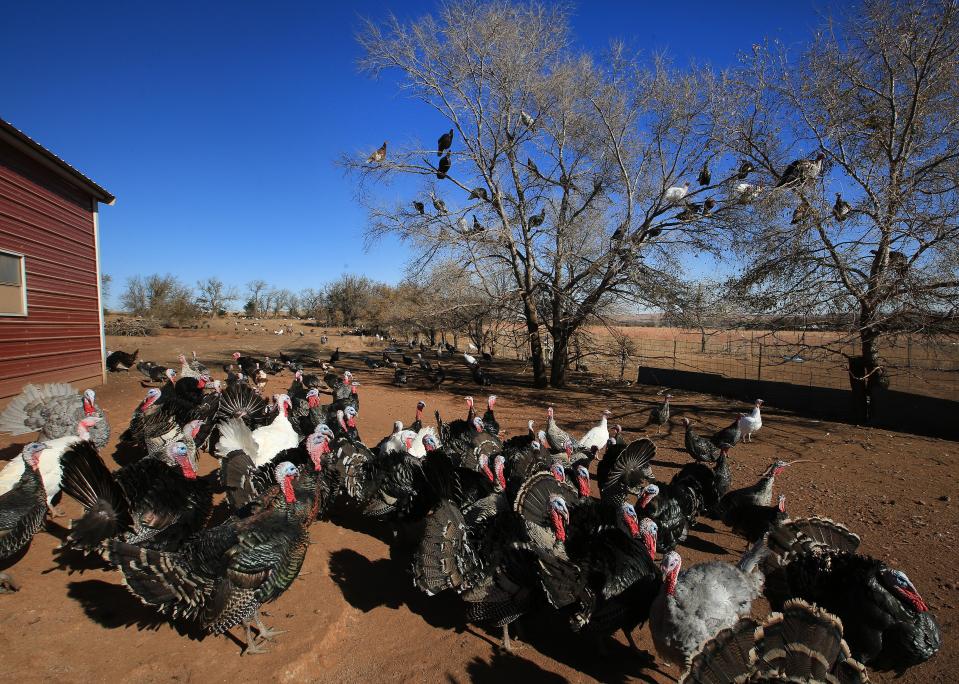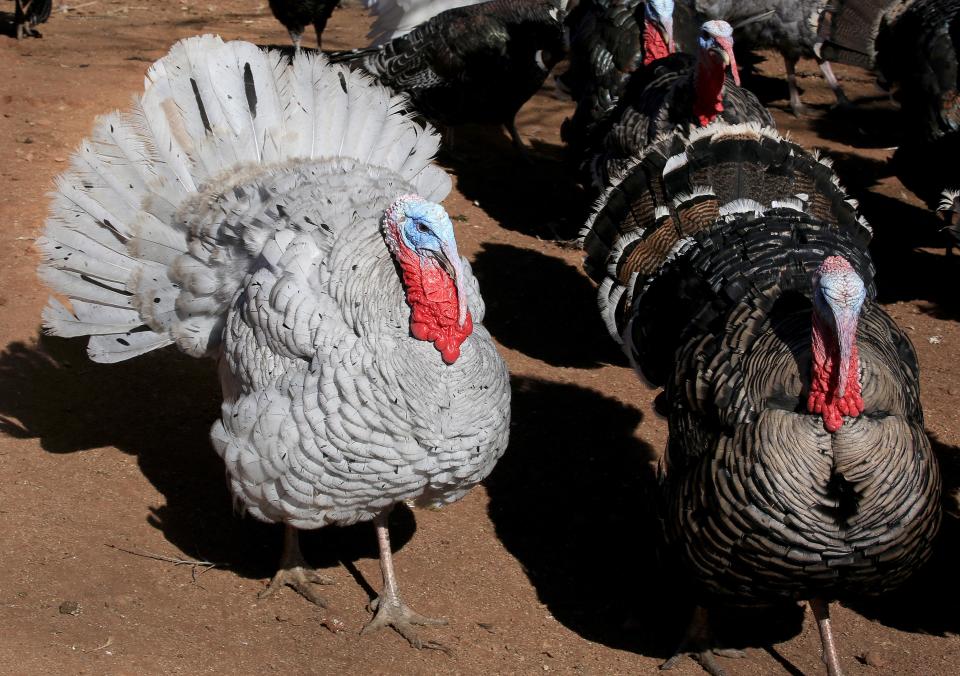Talking turkey: Is there a turkey shortage in the U.S.?

Although the supply chain seems to have some kinks in it lately, many experts say the U.S. will not experience a turkey shortage this Thanksgiving — at least not much of one.
Whether it is in a standard Butterball or a heritage breed, stores and markets say they will be well-stocked for the holiday.
"We may see a shorter supply of the frozen 10- to 14-pound size," said Sheila Regehr, corporate affairs manager for Dillons. "But we'll have plenty of the larger birds."
Regehr said Dillons, along with their parent company, Kroger, will have no shortage of fresh small, medium and large-sized birds.
Processors like Butterball, which plans to sell roughly one-third of the U.S. turkeys this Thanksgiving, are also optimistic.
"With two weeks left until Thanksgiving, we can affirm that there will be Butterball turkeys available in stores this season," said Christa Leupen of Butterball. "Thanksgiving (plans) begin more than a year in advance, and we work hard all year long with our retail partners, our network of turkey growers and our team members to ensure there is a variety of turkey sizes and products in stores for Thanksgiving."
As for specialty growers who supply heritage, or pasture-raised and genetically unaltered birds, there is no shortage either. But, because of the increase in gas, transportation and feed costs, their prices have increased.
"These are challenging times, but overall we feel great about our ability to serve our customers’ needs throughout the holidays," Regehr said. "With challenges in the supply chain, it has required a bit of nimbleness and ongoing proactiveness, but we feel ready to serve our customers this Thanksgiving."
According to the National Turkey Federation, the U.S. is the largest turkey producer in the world. The NTF reports that in 2020 about 224 million birds were raised in the top turkey-producing states of Minnesota, North Carolina, Arkansas, Indiana, Missouri, Virginia, Iowa and California. This amount equals 7.3 billion pounds of turkey that were raised in more than 2,500 farms.
Frozen turkeys vs fresh ones
Regehr said their Midwestern stores already have frozen turkeys in stock and are getting fresh turkeys of all sizes in daily. Frozen turkeys can be purchased several weeks in advance and stored in the freezer, while fresh turkeys sold in November will be good until Thanksgiving if kept refrigerated.
Butterball recommends thawing frozen turkeys in the refrigerator one day for every 4 pounds of turkey. They, like some other companies, provide a 24-hour turkey hotline. Dillons offers a Turkey 101 website.
Butterball operates six processing plants in North Carolina, Arkansas and Missouri. Along with Butterball, Dillons sells Honeysuckle, Cargill and its organic brand. The organic label means the birds are raised without hormones and fed pesticide-free grains.
"At Dillons, we are expecting to see more customers trading up for a larger turkey and selecting specialty items like “oven-ready” turkeys, bone-in turkey breast or specialty turkey cuts," Regehr said.
As for nutrition, Sandy Procter, Ph.D., an extension specialist in nutrition at K-State Research and Extension, said any frozen food is probably going to lose a slight amount of its nutritional quality after one year. But, she said, typically frozen turkeys, when we buy them, have not been frozen very long, so they would not lose their nutritional value.
"With turkey, it's relatively low fat, low calorie, protein food. So it starts off innocently enough, but if we do have fried turkey that will, of course, add calories," Procter said. "Usually the older or larger the bird, the more fat there is to it, and if we have white meat, it's going to have a little less fat than then dark meat."
But, Procter said, roasting the turkey is a relatively low-calorie way of preparing the bird. However, she warned, deep fat frying anything is going to add quite a bit of calories to the meal.
More: Small store expands farmers’ reach
Smaller shops might sell out quicker
Phil's Farm in Hutchinson raises and slaughters its own birds at its meat processing plant off Whiteside Road.
"We've presold the ones we raised ourselves," said Phil Nisly, the owner.
Fairview Farms Meat Co. in Topeka brings in smoked and frozen turkey. While the frozen ones come from Oklahoma, the smoked turkeys are brought in from Duis Meat Processing in Concordia. Smokey River Meats in Salina also carries Duis turkeys.
Claire Forster of Fairview Farms said they have a pretty good supply of turkey, although quite a few are spoken for.
Heritage breeds - many come from Kansas

Some companies like Natural Grocer and Green Acres Market in Wichita and Kansas City are selling free-range turkeys — where the birds have access to the outdoors. These grocers also carry organic turkeys as well.
Another type of turkey is the heritage breed. This means the turkey is antibiotic-free, runs around in the pasture, mates naturally, has a slow growth rate, thrives outdoors and can live a long life. These turkeys are a small percentage of the of turkeys sold each year.
More: One man’s mission is to save the turkey by opening a school for fowl
One of the largest breeders of standard bred heritage or heirloom poultry in the U.S. is Frank Reese of The Good Shepherd Poultry Ranch in Lindsborg. All of Reese’s turkeys are heritage birds and are American Poultry Association certified. These turkeys are free-range from hatchling to adulthood.
All of the 10,000 turkeys sold by Heritage Foods, a mail-order company out of New York that believes in continuing the breed without genetic alterations, come from Good Shepherd Poultry Ranch in Kansas. Founded in 2001, Heritage Foods works to preserve endangered species of livestock from extinction.
Because these turkeys take longer to mature, they cost more. And because they are not altered for having more white meat than dark, they have more dark meat.
Reese is one of the last remaining certified breeders of standard bred turkey for the American Poultry Association.
"He has a line of chickens and turkeys you can trace back 180 years," said Tom Ring of Heritage Foods. "It (the company) really was driven by the desire to make sure that these birds kept getting raised by Frank on a commercial scale and kept getting purchased by customers."
By purchasing standard bred birds, their heritage is kept alive. If no one is buying them, then no one is raising them and they and their genetic line disappear.
"It's really important to have biodiversity in the food chain and in the food system," Ring said. "There's a lot of companies and there's a lot of attention about free-range chickens, free-range turkeys, and that's really important, but their genetics (are not paid attention to.)"

Sweet potatoes and fixings
According to Butterball, 85% of Americans plan to have a turkey this Thanksgiving. And from the outlook of the turkey market, they will get their bird. But other commodities might be in short supply due to supply chain stickiness.
Regehr of Dillons said she does not have specifics on shortages. But she, like other suppliers said, there will likely be some disruptions with the supply chain.
"We know that with the constraints on the supply chain overall we will have some challenges, but we've been working proactively to stay ahead of those challenges," she said. "So we feel like we're ready for the Thanksgiving holiday."
This article originally appeared on The Hutchinson News: All types of Thanksgiving turkeys will be available in Kansas

